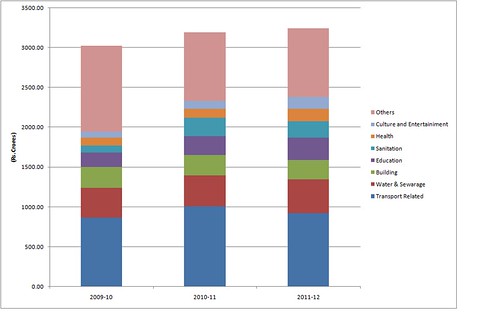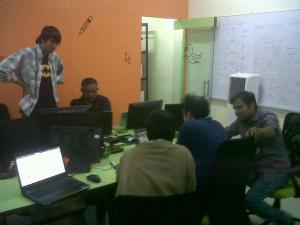(This is a guest post by Sanskriti Menon, who is a Programme Diretor, at the Center for Environment Education, Pune. PMC is now not only allowing citizens to suggest additions to the local budgets, but the form can be filled online (and that is why this item does belong to PuneTech.) The what, why and how are covered below, but if you do decide to submit an entry, please note the following: go to PuneCorporation.org, click on the “Participatory Budget 2010-11” link around the middle of the page, and then on the next page you get a page with instructions in Marathi. Scroll to the bottom of the page, and click “Accept”. That will give you the actual form.)
What is Participatory Budgeting?
The Participatory Budget of the PMC provides an opportunity for citizens to give suggestions for works to be taken up in the next financial year. Citizens can make suggestions for streetlights, footpaths, public toilets, waste sorting shed/ biogas plant/ bulk compost unit, drainage etc, in spaces where such works are permissible and needed. Participatory Budget has been carried out in Pune over the last three years. It is a mechanism for citizens to give inputs for works to be carried out through the ward offices. The final decision regarding the budget of our city government is of course taken by our elected representatives with inputs from the administration.
What is the process citizens are to follow?
Citizens can make their suggestions online in the E-Budgeting application available on the PMC website from 26th October to 09 November 2009. The form is available at www.punecorporation.org
Suggestions can also be made in the prescribed forms available at ward offices. All ward offices are also making arrangements for online entry. When submitting the paper form, citizens must ensure that it is duly in-warded at the ward office and the tear-off receipt with inward entry number is given. This number will be needed to the unique id number after computerization. Those submitting suggestions online will directly get the unique ID number on completion of the entry. This number will be needed to track the suggestion and what decision is taken about it.
Of course, citizens have to be clear that submission of suggestions does not necessarily mean that the work will be accepted. The PMC has to check the feasibility and the Prabhag Samiti will be making their decision too.
What is the benefit of Participatory Budgeting?
Participatory Budget is a refinement in the ‘institutional design’ of the democratic process to make it more responsive to citizens’ needs. Our democratic process is that we citizens elect our representatives to take decisions that are well thought out, in keeping with societal and environmental concerns, and responding to our needs. However, a necessary condition for representative democracy to function well is that citizens actively provide inputs to elected representatives. This happens in many ways through RTI, the media, NGOs etc. Draft master plans and new policy drafts are kept open for a specified period for public input. The most direct method is of course discussions with corporators. However, in a city where the ratio of representation is about 15000 citizens to one corporator this may pose some problems.
The participatory budget process helps to deepen our existing democratic framework. It is an evolving mechanism to enable the democratic process to function better. The underlying idea is that citizens get a formal opportunity to deliberate upon the needs of their areas and submit requests to the respective administrative ward offices.
What are the achievements so far?
A few thousand people have participated in the exercise over the years. Last year over 1300 suggestions for works were received. Over 35 crore worth of projects were incorporated into the main budget. There is recognition that some project ideas are mundane (fix a pavement); but the fact that citizens have to ask for these is a telling comment on how these very aspects may be ignored in conventional budgeting processes. There are the not-so-usual ideas as well – sorting sheds, composting units, benches, hawking zone platforms, etc.
Is PB happening anywhere else?
In many parts of the world! Participatory Budgeting started in Latin American countries struggling to build or rebuild their democratic institutions and to eliminate corruption, improve transparency and accountability of government. The innovation of ‘participatory budgeting’ has been praised internationally as an example of “good” governance.
In Brazil, citizens deliberate on five thematic areas: transport and traffic circulation; education, leisure and culture; health and social welfare; economic development and taxation; city organization and urban development. Meetings are held in each neighbourhood, where residents draw up their list of priorities for investment in infrastructure. These inputs are provided to the municipal budget council who determines the distribution of funds for each priority among districts. The municipal budget council and the district budget fora also monitor spending year-round.
In UK, talking about participatory budgeting, Secretary of State for Communities and Local Government Hazel Blear said “councilors must not feel their democratic mandate is bypassed, and instead recognize that it will strengthen their relationship with their local community”. Also, that, “I think the world has changed. I think voting every four years and basically handing over responsibility and power to other people and then doing nothing again for four years, I think our democracy is not like that any more.” Ms Blear may well be talking about our city!
Intructions for Participatory Budgeting
PMC’s Citizen Suggestion Form is available online at www.punecorporation.org
(scroll down to ‘What would you like to do’ (above Swine Flu)
General instructions for suggesting works
- Please fill in all columns
- Citizens should note that suggesting a work does not necessarily mean its inclusion in the budget; the projects inclusion/ exclusion will be determined on technical and legal considerations
- All suggested works should be specific (location, description, quantity, category etc) (attach maps, photos where needed – fill a physical form in this case)
- Only projects that pertain to neighbourhood or locality level works are to be suggested, not city level infrastructure
- The cost of suggested works should preferably be below Rs 5 lakh
- Projects of the following type are admissible: pavements, water supply, drainage, bus stop (in consultation with PMT), parks and gardens (only repair works), bhawan (only repair works), public toilets, lights (roads and traffic), roads (only resurfacing)
- Projects of following type are not admissible: pedestrian bridges, speed breakers (prohibited by Supreme Court), garden (new provision), construction on land not owned by PMC
- Non budgetable projects should be avoided – For e.g. appointment of staff, minor repairs, clean up etc
- Deadline for submission is 09 Nov 2009
- When submitting the paper form, citizens must ensure that it is duly in-warded at the ward office and the tear-off receipt with inward entry number is given. This number will be needed to the unique id number after computerization. Those submitting suggestions online will directly get the unique ID number on completion of the entry. This number will be needed to track the suggestion and what decision is taken about it.
- Suggestions can also be made in the prescribed forms available at ward offices. All ward offices are also making arrangements for online entry.
For more information, visit
www.janwani.org
http://government.wikia.com/wiki/Participatory_Budgeting_in_Pune
http://www.desd.org/efc/Participatory%20Budgeting.htm
About the Author – Sanskriti Menon
Sanskriti Menon is a Programme Director for the CEE Urban Programmes and Central Regional Cell of the Centre for Environment Education. CEE is an organization that works towards improving the awareness of environmental issues in our education system. It is supported by the Ministry of Envirnoment and Forests. Sanskriti also runs greenteacher.org, and she is also one of the primary driving forces behind the huge success of the Pune governance wiki.








![Reblog this post [with Zemanta]](http://img.zemanta.com/reblog_b.png?x-id=32a3c41e-197a-45ad-91ad-844056c49061)
![Reblog this post [with Zemanta]](http://img.zemanta.com/reblog_b.png?x-id=104c3c9e-5e27-4c4f-a927-93e1936d5c78)
![Reblog this post [with Zemanta]](http://img.zemanta.com/reblog_b.png?x-id=e764c4e4-2969-4fa7-9a49-deaa77dff85d)

![Reblog this post [with Zemanta]](http://img.zemanta.com/reblog_b.png?x-id=215ea8dd-4876-4686-989e-459a55cb47ad)